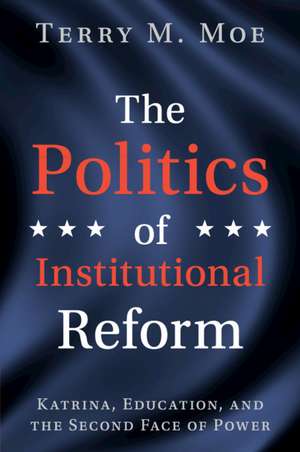The Politics of Institutional Reform: Katrina, Education, and the Second Face of Power
Autor Terry M. Moeen Limba Engleză Paperback – 4 sep 2019
Preț: 279.98 lei
Nou
Puncte Express: 420
Preț estimativ în valută:
53.57€ • 56.09$ • 44.33£
53.57€ • 56.09$ • 44.33£
Carte tipărită la comandă
Livrare economică 07-21 aprilie
Preluare comenzi: 021 569.72.76
Specificații
ISBN-13: 9781108740388
ISBN-10: 1108740383
Pagini: 176
Dimensiuni: 150 x 229 x 12 mm
Greutate: 0.27 kg
Editura: Cambridge University Press
Colecția Cambridge University Press
Locul publicării:New York, United States
ISBN-10: 1108740383
Pagini: 176
Dimensiuni: 150 x 229 x 12 mm
Greutate: 0.27 kg
Editura: Cambridge University Press
Colecția Cambridge University Press
Locul publicării:New York, United States
Cuprins
Introduction; 1. Power, vested interests, and the politics of institutional reform; 2. Before Katrina: the normal politics of reform; 3. After Katrina: reform with the lid off; 4. Protecting the revolution: toward a new normal; 5. Learning from Katrina.
Recenzii
'A groundbreaking contribution. By creatively leveraging Katrina's impact on New Orleans education reform as a natural experiment, Moe generates fresh insights into the role of power in sustaining poorly performing institutions and sheds new light on society's potential for problem-solving and real reform. A must-read.' Eric M. Patashnik, Brown University, Rhode Island
'Beautifully written, rich in descriptive detail, and propelled by a singular idea, The Politics of Institutional Reform packs a punch. This isn't just a book about education reform. It is a book about all public policy all the time: about how vested-interest power prevents society from fixing its institutions - and how, when that power is swept away, reforms once deemed heretical can become commonplace.' William Howell, University of Chicago
'Terry M. Moe uses the case of Hurricane Katrina to generate fundamental insights into the politics of institutional reform. Moe demonstrates how the 'second face of power' ordinarily allows vested interests to stifle major reform, and shows how institutional politics are transformed when their power is disrupted. A must-read for anyone interested in understanding the dynamics of institutional stability and change - and the challenge of fixing failing institutions.' Eric Schickler, University of California, Berkeley
'Terry M. Moe uses a theorist's insight to cut through the clutter surrounding New Orleans' school transformation. As he shows, smart pragmatists like Paul Pastorek can do sensible things, but only when the guardians of the status quo lose their blocking power. The result is a novel and revealing analysis of how power shapes the prospects for institutional reform.' Paul Hill, Center for Reinventing Public Education, University of Washington
'Beautifully written, rich in descriptive detail, and propelled by a singular idea, The Politics of Institutional Reform packs a punch. This isn't just a book about education reform. It is a book about all public policy all the time: about how vested-interest power prevents society from fixing its institutions - and how, when that power is swept away, reforms once deemed heretical can become commonplace.' William Howell, University of Chicago
'Terry M. Moe uses the case of Hurricane Katrina to generate fundamental insights into the politics of institutional reform. Moe demonstrates how the 'second face of power' ordinarily allows vested interests to stifle major reform, and shows how institutional politics are transformed when their power is disrupted. A must-read for anyone interested in understanding the dynamics of institutional stability and change - and the challenge of fixing failing institutions.' Eric Schickler, University of California, Berkeley
'Terry M. Moe uses a theorist's insight to cut through the clutter surrounding New Orleans' school transformation. As he shows, smart pragmatists like Paul Pastorek can do sensible things, but only when the guardians of the status quo lose their blocking power. The result is a novel and revealing analysis of how power shapes the prospects for institutional reform.' Paul Hill, Center for Reinventing Public Education, University of Washington
Notă biografică
Descriere
Treating Hurricane Katrina as a natural experiment, Moe explores New Orleans' education reform to reveal how political power shapes efforts to fix failing institutions.
